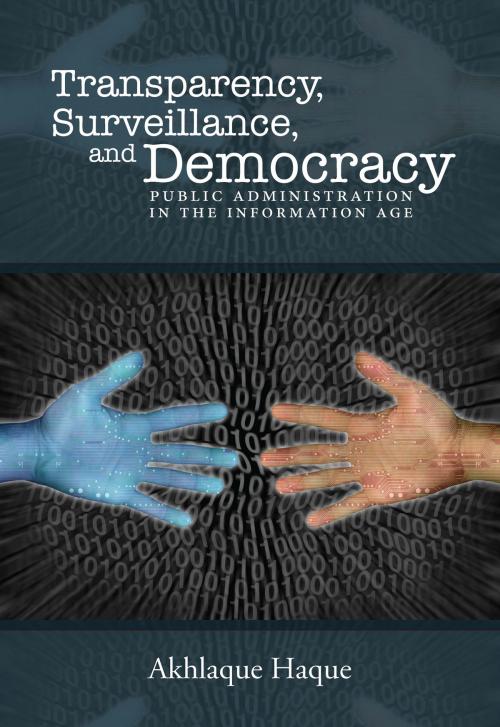Surveillance, Transparency, and Democracy
Public Administration in the Information Age
Nonfiction, Social & Cultural Studies, Political Science, Government, Public Affairs & Administration| Author: | Akhlaque Haque | ISBN: | 9780817388768 |
| Publisher: | University of Alabama Press | Publication: | August 31, 2015 |
| Imprint: | University Alabama Press | Language: | English |
| Author: | Akhlaque Haque |
| ISBN: | 9780817388768 |
| Publisher: | University of Alabama Press |
| Publication: | August 31, 2015 |
| Imprint: | University Alabama Press |
| Language: | English |
In this well-informed yet anxious age, public administrators have constructed vast cisterns that collect and interpret a meteoric shower of facts. In Surveillance, Transparency, and Democracy, Akhlaque Haque demonstrates that this pervasive use and increasing dependence on information technology (IT) enables sophisticated and well-intentioned public services that nevertheless risk deforming public policy decision-making. Haque sees the contradiction at the core of a public that seeks services that require a level of data collection that triggers fears of a tyrannical police state.
Haque begins by explaining that information has become a vital resource, offering a theoretical framework for its analysis. He then shows that an organization’s information-gathering skill is reflected in its IT sophistication, but warns that successful IT strategies can by stunted by symbolic but shallow gestures such as the appointment of a “Chief Information Officer.” He further outlines how the dependence on IT can create a reflex for IT solutions that fail to reflect the values of the citizenry they’re intended to serve.
Haque posits that IT’s potential as a tool for human development depends on how civil servants and citizens actively engage in identifying desired outcomes, map IT solutions to those outcomes, and routinize the applications of those solutions. This leads to his call for the development of entrepreneurs who generate innovative solutions to critical human needs and problems. In his powerful summary, Haque recaps possible answers to the question: “What is the best way a public institution can apply technology to improving the human condition?”
Haque masterfully flexes between crisp logical arguments and a deep empathy for human values. He finds apt metaphors that bring multifaceted scenarios into clear focus for experts and laymen alike. Engrossing, challenging, and important, Surveillance, Transparency, and Democracy is essential reading for both policy makers as well as the great majority of readers and citizens engaged in contemporary arguments about the role of government, public health and security, individual privacy, data collection, and surveillance.
In this well-informed yet anxious age, public administrators have constructed vast cisterns that collect and interpret a meteoric shower of facts. In Surveillance, Transparency, and Democracy, Akhlaque Haque demonstrates that this pervasive use and increasing dependence on information technology (IT) enables sophisticated and well-intentioned public services that nevertheless risk deforming public policy decision-making. Haque sees the contradiction at the core of a public that seeks services that require a level of data collection that triggers fears of a tyrannical police state.
Haque begins by explaining that information has become a vital resource, offering a theoretical framework for its analysis. He then shows that an organization’s information-gathering skill is reflected in its IT sophistication, but warns that successful IT strategies can by stunted by symbolic but shallow gestures such as the appointment of a “Chief Information Officer.” He further outlines how the dependence on IT can create a reflex for IT solutions that fail to reflect the values of the citizenry they’re intended to serve.
Haque posits that IT’s potential as a tool for human development depends on how civil servants and citizens actively engage in identifying desired outcomes, map IT solutions to those outcomes, and routinize the applications of those solutions. This leads to his call for the development of entrepreneurs who generate innovative solutions to critical human needs and problems. In his powerful summary, Haque recaps possible answers to the question: “What is the best way a public institution can apply technology to improving the human condition?”
Haque masterfully flexes between crisp logical arguments and a deep empathy for human values. He finds apt metaphors that bring multifaceted scenarios into clear focus for experts and laymen alike. Engrossing, challenging, and important, Surveillance, Transparency, and Democracy is essential reading for both policy makers as well as the great majority of readers and citizens engaged in contemporary arguments about the role of government, public health and security, individual privacy, data collection, and surveillance.















